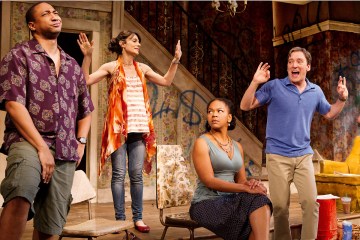Suzie Toase, Oliver Chris, James Corden and Jemima Rooper perform in a scene from "One Man, Two Guvnors," at the Music Box Theatre in New York.
One Man, Two Guvnors, the hit London farce that opened last week on Broadway, is shameless: it will do literally anything for a laugh. There are mistaken identities, slapstick pratfalls and a crazy dinner scene in which the buffoonish hero tries to serve dinner to two different bosses in two different rooms of the same restaurant at the same time. The star of the show expectorates weird things from his mouth, gets his tongue caught in a mousetrap, flails around on the ground having a fight with himself, and plays washboard on his bare chest to accompany an onstage skiffle band. Crotches are grabbed, audience members are pulled up onstage and abused, and there’s a doddering, 87-year-old waiter, assigned to handle the fine china even though he has balance problems, is nearly deaf, needs a cataract operation and wears a pacemaker that requires constant adjustment so he won’t fall headlong down the kitchen stairs.
“And one other thing,” says the head waiter, completing the fellow’s resumé with the funniest capper of the season: “It’s his first day.”
Richard Bean’s play, an adaptation of Carlo Goldoni’s 18th-century farce The Servant of Two Masters, has an outlandish plot, involving a band of low-rent gangsters in 1963 Brighton, that I frankly couldn’t make head or tail of. A few of the British jokes fell flat on this American ear (“First names are for girls and Norwegians”), and the show loses some steam in the second act. But most of the way, directed with amazing invention and verve by Nicholas Hytner and starring a force of nature called James Corden, the thing is impossible to resist.
(READ: Broadway’s Old New Hit: Death of a Salesman)
Corden, a sandy-haired, roly-poly British stand-up comic, stuffed into a plaid suit out of which he bulges like a sack of flour, simply takes over the show. Not just with the dexterity and grace of his physical comedy (tumbling over the furniture, say, while trying to catch peanuts in his mouth), but with his insouciant, seemingly improvisational toying with the fourth wall. Much of the show’s novelty lies in how Corden and Hytner keep the audience on edge, trying to guess just which part of the chaos onstage is real and which is trickery. Is that really Corden racing back and forth across the stage at seemingly impossible speeds in a madcap chase scene? Did the actor really chew up that letter and swallow it? Are those poor spectators brought up onstage to lift a steamer trunk or hold a soup tureen really audience members, or just plants?
I won’t tell. It would spoil the fun of a show that delivers more of it, pound for pound, than anything else on Broadway.

Nathan Johnson Photography / The O+M Co. / AP
Clybourne Park, for some odd reason, has also been described as a comedy, and there are surely some laughs in it (too many, for my money). But it is at bottom a deadly serious, if sharply satiric, play about the always serious subject of race in America.
The best thing about Bruce Norris’ play (which won last year’s Pulitzer Prize for drama, and had successful runs off-Broadway and in London before coming to Broadway) is its ingenious central conceit. The first act takes place in 1959, in an all-white Chicago neighborhood, where a couple are selling their house to a black family — causing the inevitable neighborhood fireworks. The second act takes place exactly 50 years later, in the same house in the now all-black neighborhood, where a white yuppie couple are about to move in — prompting a parallel ruckus among the black neighbors over the coming gentrification.
(LIST: Top 10 Plays and Musicals of 2011)
I have a split verdict. The first act struck me as overdone and patronizing, in the manner of so many current plays that look back at, and down on, the benighted past. Nearly every character is a 1950s cliché, or an idiot: the flibbertigibbet matron of the house, the clueless neighborhood pastor, the racist nerd who represents the outraged neighborhood association. Norris fills up too much time with irrelevant gab (a married couple arguing over world capitals) and brings in a distracting subplot: the couple’s son, a Korean war vet, has committed suicide in the house.
The second act is much stronger, mainly because Norris seems on firmer ground satirizing his contemporaries — the self-involved, self-consciously liberal yuppies busily going over plans for the neighborhood’s renovation. All of the actors from the first act portray new characters in Act 2, and almost every one of them is better, and truer. Crystal Dickinson and Damon Gupton, for example, play a stereotypical maid and her husband in Act 1, but blossom later into the polite but quietly appalled black neighbors resisting the gentrification brigade.
Dialogue from the first act is slyly echoed in the second, in different contexts, making neat points about the changes in racial and social attitudes over 50 years. The dead son comes back too, and he still seems to belong to another play (Other Desert Cities, perhaps, which has an almost identical off-stage character). But Norris is a real craftsman, and a shrewd social observer, and he’s written at least half of a provocative play.
Zoglin, TIME’s theater critic and a former assistant managing editor, is the author of Comedy at the Edge: How Stand-up in the 1970s Changed America

